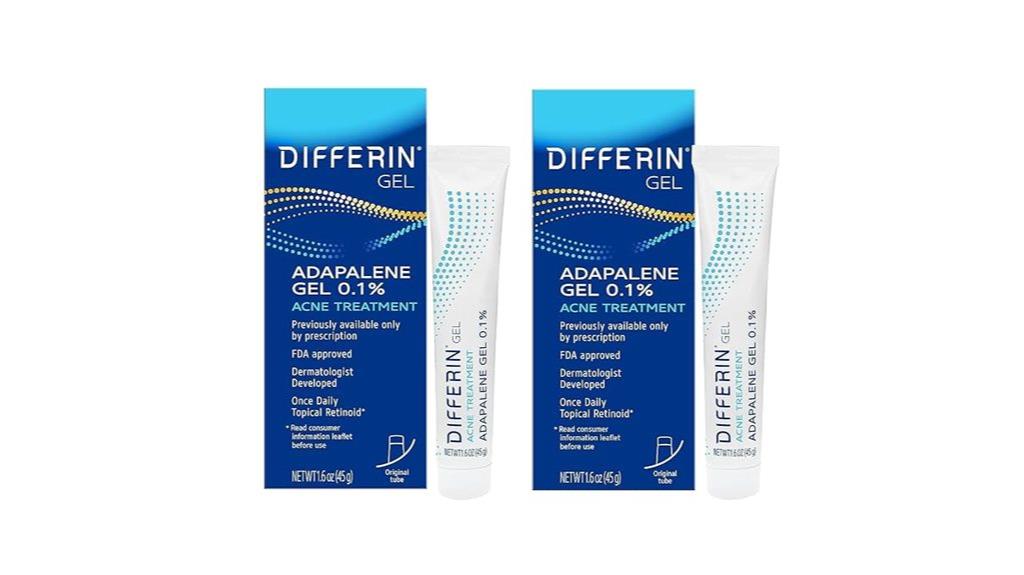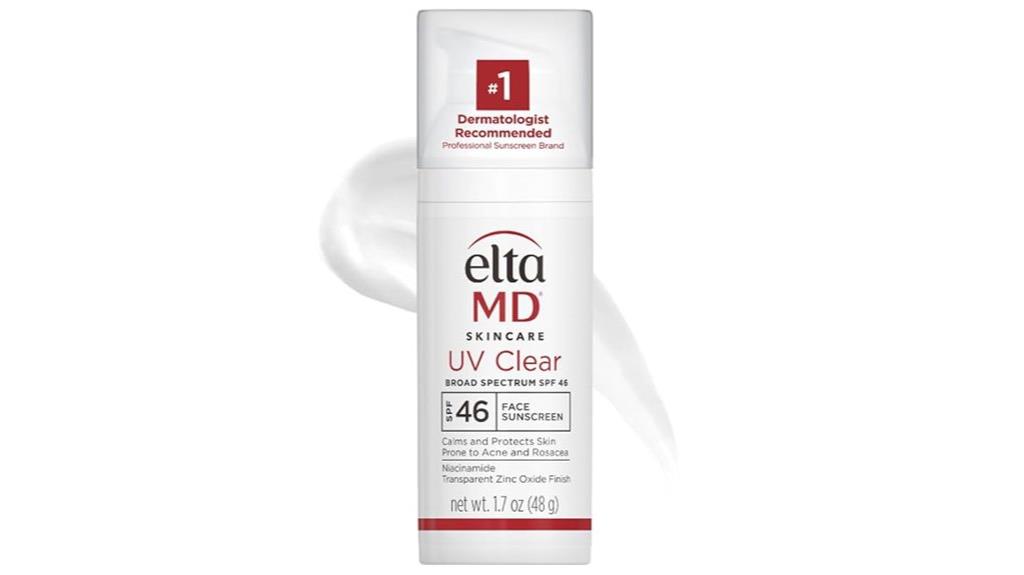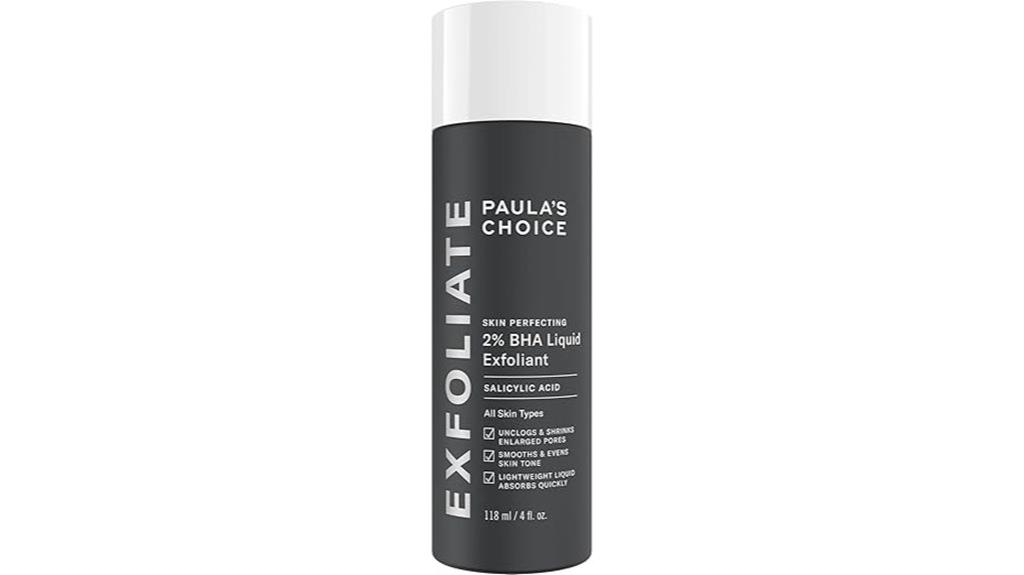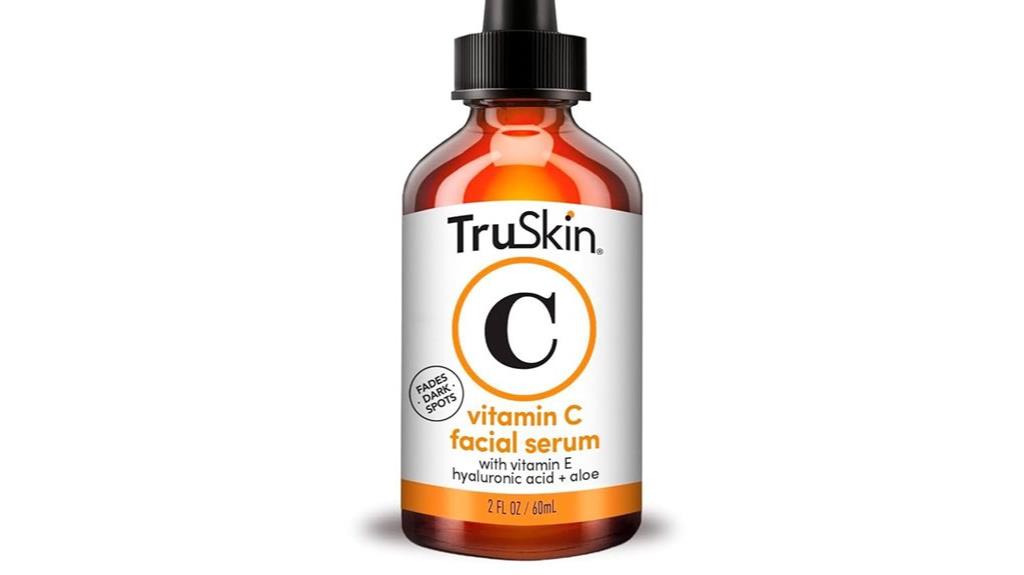If you've struggled with acne on melanin-rich skin, you're not alone. Managing breakouts while preventing hyperpigmentation can feel like a delicate balancing act. But don't worry—there's hope for achieving clear, radiant skin. By understanding the unique needs of your skin type and adopting targeted skincare strategies, you can effectively combat acne without compromising your skin's health. From gentle cleansing techniques to powerful ingredients that work wonders on dark skin, we'll explore the essential tips that'll transform your complexion. Ready to reveal the secrets to acne-free, glowing skin? Let's plunge into.
Key Takeaways
- Use gentle, non-comedogenic cleansers and lukewarm water to preserve natural oils and prevent irritation.
- Incorporate ingredients like salicylic acid, niacinamide, and low-concentration benzoyl peroxide for effective acne treatment.
- Prevent post-inflammatory hyperpigmentation by avoiding picking and using ingredients that inhibit melanin production.
- Apply broad-spectrum SPF 30+ sunscreen daily to protect against UV-induced darkening and hyperpigmentation.
- Establish a consistent skincare routine tailored to your skin type, incorporating gentle cleansing, hydration, and acne treatments.
Understanding Melanin-Rich Skin
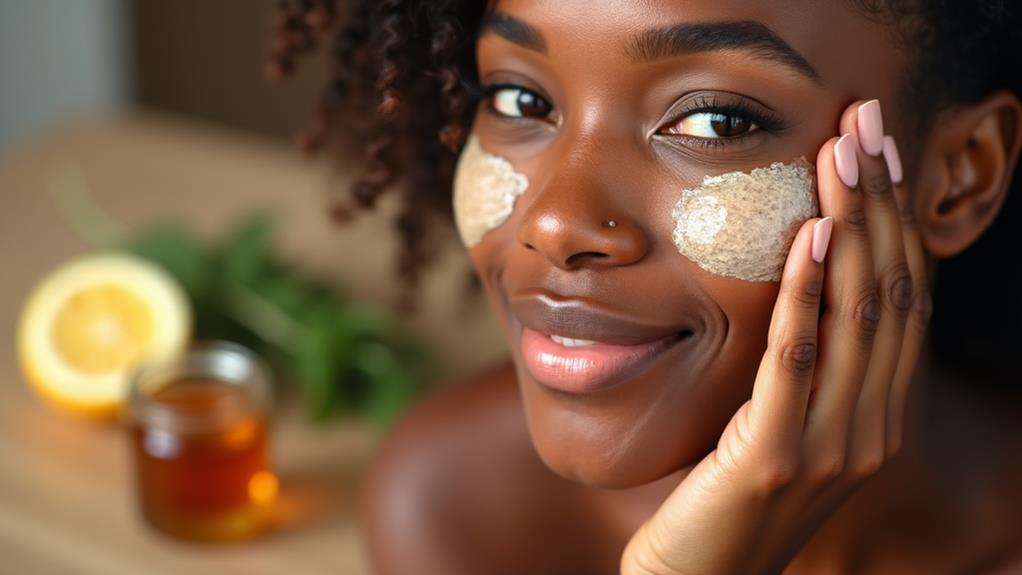
Three key factors set melanin-rich skin apart: higher melanin content, increased oil production, and a unique cellular structure.
Melanin, the pigment responsible for skin color, offers natural sun protection but can lead to hyperpigmentation when skin is damaged. This makes your skin more prone to dark spots and uneven tone, especially after acne breakouts.
Your skin's increased oil production helps maintain moisture and a youthful appearance. However, it also means you're more susceptible to clogged pores and acne. The good news? This extra oil can delay visible signs of aging.
The cellular structure of melanin-rich skin is denser, with tighter connections between cells. While this provides added protection, it can make it harder for skincare products to penetrate deeply.
It's vital to choose products specifically formulated for your skin type.
Understanding these unique characteristics will help you tailor your skincare routine effectively.
You'll need to focus on gentle cleansing, oil control, and hyperpigmentation prevention. By addressing these specific needs, you can maintain clear, healthy skin while embracing its natural beauty and protective qualities.
Common Acne Triggers
Several common factors can trigger acne in melanin-rich skin, making it vital to identify and address them. Hormonal changes, particularly during puberty, menstruation, and pregnancy, can increase oil production and lead to breakouts.
Stress is another significant trigger, as it stimulates hormone production that can worsen acne. Your diet may also play a role. Some studies suggest that high-glycemic foods and dairy products might exacerbate acne in some individuals.
Environmental factors, such as humidity and pollution, can clog pores and contribute to breakouts. Certain skincare and cosmetic products, especially those that are oil-based or comedogenic, may also trigger acne.
Genetics can influence your skin's susceptibility to acne, so you might be more prone to breakouts if it runs in your family. Additionally, certain medications, such as corticosteroids and lithium, can trigger or worsen acne.
It's important to be aware of these potential triggers and observe how they affect your skin. By identifying your personal acne triggers, you'll be better equipped to manage and prevent breakouts, leading to clearer, healthier skin.
Gentle Cleansing Techniques
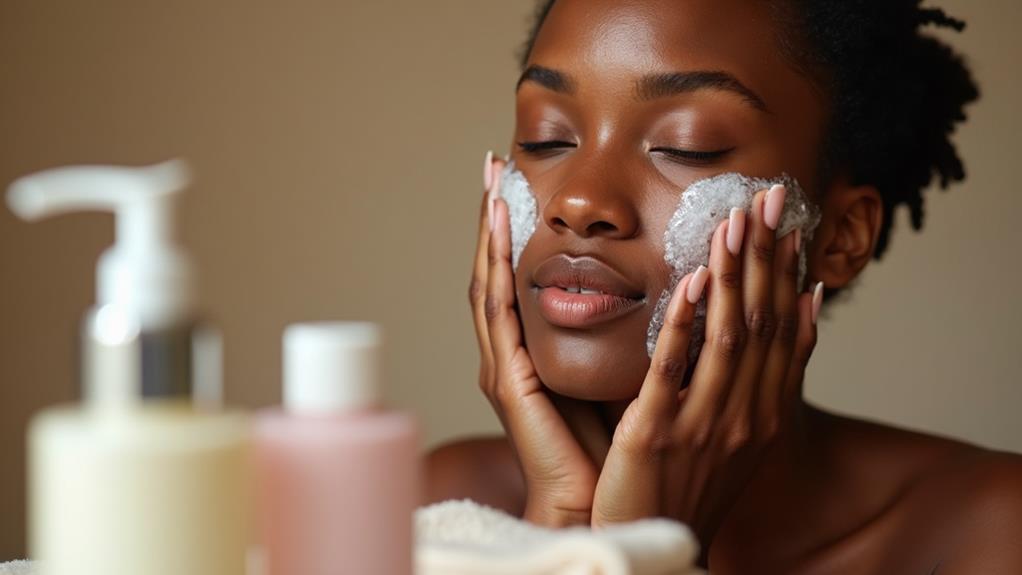
While maintaining a clean face is essential for managing acne, it's important to use gentle cleansing techniques that won't irritate melanin-rich skin.
Start by choosing a mild, non-comedogenic cleanser that's free from harsh chemicals and fragrances. Avoid hot water, which can strip your skin of natural oils, and opt for lukewarm water instead.
Use your fingertips to apply the cleanser in circular motions, focusing on areas prone to acne. Don't scrub aggressively or use abrasive materials like washcloths or loofahs, as these can cause micro-tears in your skin and lead to hyperpigmentation.
Rinse thoroughly and pat your face dry with a clean, soft towel.
Limit washing to twice a day, in the morning and before bed. Over-cleansing can disrupt your skin's natural barrier and trigger excess oil production. If you need to freshen up during the day, use a gentle micellar water or oil-free wipe.
For stubborn makeup, use an oil-based cleanser first, followed by your regular cleanser. This double-cleansing method guarantees all impurities are removed without over-stripping your skin.
Effective Ingredients for Dark Skin
When it comes to treating acne on dark skin, choosing the right ingredients is essential. You'll want to focus on products that combat acne without causing irritation or hyperpigmentation.
Look for ingredients like salicylic acid, which penetrates pores and exfoliates gently, reducing acne without over-drying your skin.
Niacinamide is another powerful ingredient for dark skin. It helps regulate oil production, reduces inflammation, and can even out skin tone.
For spot treatments, consider benzoyl peroxide in low concentrations (2.5% to 5%) to avoid irritation.
Don't overlook the power of natural ingredients. Aloe vera can soothe inflammation and promote healing, while tea tree oil offers antibacterial properties.
Vitamin C is excellent for brightening skin and fading acne scars, but use it cautiously as it can be irritating in high concentrations.
Lastly, incorporate ingredients that support your skin's moisture barrier. Hyaluronic acid and glycerin attract moisture, while ceramides help lock it in.
Preventing Post-Inflammatory Hyperpigmentation

Post-inflammatory hyperpigmentation (PIH) is a common concern for those with dark skin dealing with acne. This condition occurs when inflammation triggers excess melanin production, leaving behind dark spots after acne lesions heal. To prevent PIH, you'll need to focus on both acne prevention and careful treatment of existing breakouts.
Start by establishing a consistent skincare routine that includes gentle cleansing and non-comedogenic moisturizers. Incorporate products with ingredients like niacinamide, vitamin C, and alpha-arbutin, which can help inhibit melanin production.
When treating active acne, avoid picking or squeezing pimples, as this can increase inflammation and PIH risk. Use spot treatments containing salicylic acid or benzoyl peroxide, but be cautious not to over-dry your skin. Always follow up with a moisturizer to maintain skin barrier health.
Sun protection is essential, so apply a broad-spectrum SPF 30+ sunscreen daily to prevent further darkening of hyperpigmented areas. If you're using acne treatments like retinoids or chemical exfoliants, introduce them gradually to minimize irritation.
Consider consulting a dermatologist for personalized advice, especially if you're prone to PIH or have persistent acne.
Professional Treatments for Melanated Skin
Dermatologists offer a range of professional treatments tailored for melanated skin to address acne and hyperpigmentation concerns. These treatments are designed to be effective while minimizing the risk of further pigmentation issues.
Chemical peels are a popular option, using solutions like glycolic or salicylic acid to exfoliate the skin and reduce acne and dark spots.
For deeper concerns, your dermatologist might recommend microdermabrasion or microneedling, which can stimulate collagen production and improve skin texture.
Laser treatments have become increasingly sophisticated for melanated skin. Newer technologies like the 1064nm Nd:YAG laser can target acne and hyperpigmentation without damaging surrounding tissue.
Photodynamic therapy combines light treatment with photosensitizing agents to combat stubborn acne.
For severe cases, your dermatologist might suggest prescription medications like isotretinoin or topical retinoids. These can be highly effective but require careful monitoring to avoid side effects.
It's essential to consult a dermatologist experienced in treating melanated skin. They'll consider your skin type, concerns, and medical history to create a personalized treatment plan that's both safe and effective for your unique needs.
Building a Customized Skincare Routine

While professional treatments can be effective, the cornerstone of healthy skin is a well-crafted daily routine. To build a customized skincare regimen for melanated skin, you'll need to take into account your specific skin type and concerns.
Start with a gentle, non-irritating cleanser that won't strip your skin of its natural oils. Look for ingredients like glycerin or hyaluronic acid to maintain hydration.
Follow up with a toner to balance your skin's pH and remove any remaining impurities.
For acne-prone skin, incorporate a treatment step using products containing salicylic acid or benzoyl peroxide. Be cautious with these ingredients, as they can be drying.
Next, apply a lightweight, oil-free moisturizer to keep your skin hydrated without clogging pores.
Don't forget sun protection! Use a broad-spectrum SPF 30 or higher daily, even on cloudy days. Choose a formula that doesn't leave a white cast on darker skin tones.
At night, think about adding a retinoid to your routine. This can help with both acne and hyperpigmentation. Start with a low concentration and gradually increase as your skin adjusts.
Join The Discussion
What are your go-to products or strategies for managing acne and hyperpigmentation on melanin-rich skin? Share your experiences, tips, and success stories to help others achieve their skincare goals with confidence.

Elevate your skincare routine with these essential products, designed to keep melanin-rich skin clear, balanced, and radiant.



